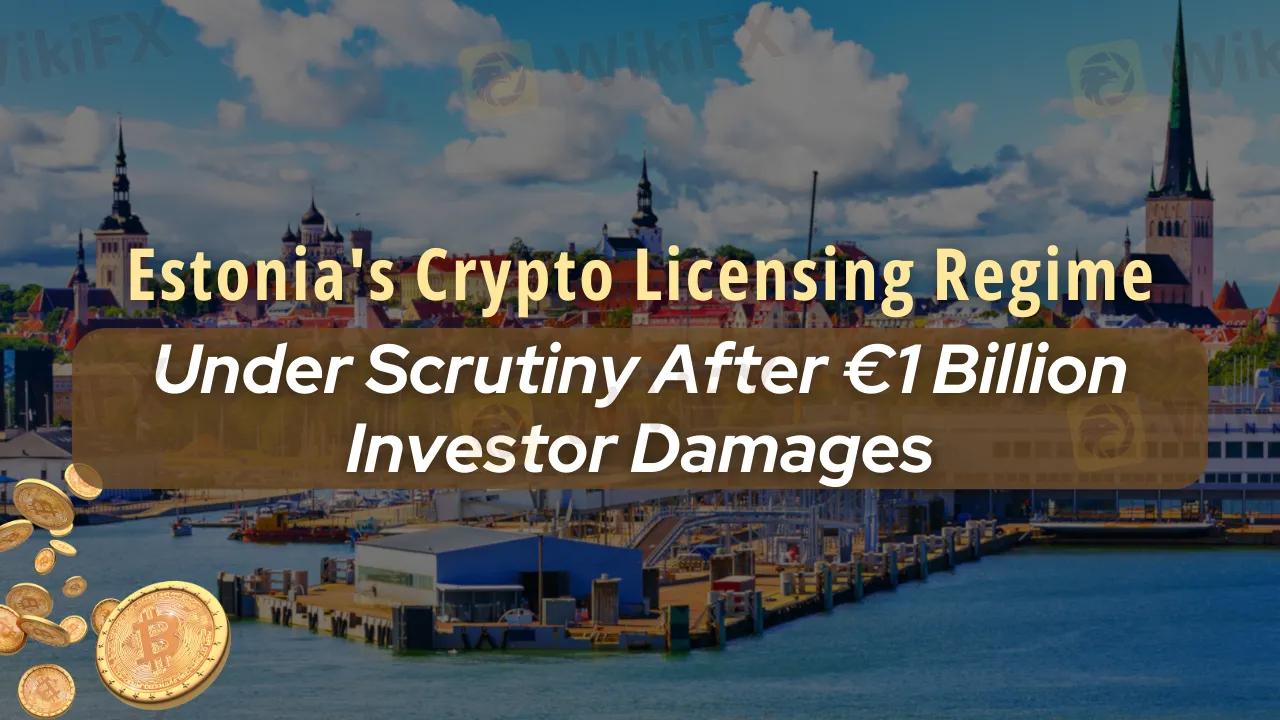简体中文
繁體中文
English
Pусский
日本語
ภาษาไทย
Tiếng Việt
Bahasa Indonesia
Español
हिन्दी
Filippiiniläinen
Français
Deutsch
Português
Türkçe
한국어
العربية
Estonia's Crypto Licensing Regime Under Scrutiny After €1 Billion Investor Damages
Abstract:Estonia's lenient crypto licensing is now in the spotlight as Vsquare exposes a €1 billion scandal. Licensed crypto firms in Estonia are accused of deceit, fraud, and money laundering, damaging the country's reputation. The report uncovers scams, sanctions evasion, and ties to Russia's intelligence services.

Estonia, once known for its lenient licensing regulations for cryptocurrency companies, is now facing severe criticism and scrutiny following a damning investigative report by Vsquare. The report reveals a web of deceit, fraud, and money laundering activities orchestrated by licensed crypto firms in Estonia, resulting in estimated damages of over €1 billion.
The Vsquare investigative report sheds light on how bad actors exploited Estonia's liberal crypto licensing regime, duping investors and engaging in various criminal activities. Among the findings were numerous instances of scams, schemes to evade sanctions, and money laundering operations. These activities have not only tarnished Estonia's reputation but have also had far-reaching consequences.
Estonia's once-enticing crypto landscape, which aimed to attract businesses dealing with digital assets, underwent a significant transformation in recent years. The investigative report reveals shocking statistics – out of the 1,600 licensed entities in the crypto sector, more than a third relied on the services of just three company formation agencies.
What's even more alarming is the background of individuals responsible for crucial roles within these crypto firms. Among them were a taxi driver in debt, a welder banned from welding, a jobless plumber, and a person residing in state-funded housing. These individuals collectively managed over 60 crypto firms, raising questions about the competence of the licensed entities.

One of the most concerning aspects highlighted in the report is the connection between these “Estonian” crypto companies and Russia's intelligence services and sanctioned banks. These entities were allegedly behind numerous international fraud cases, contributing to the staggering €1 billion in damages.
The report spotlights a specific case involving Cyfroncapital OÜ, a firm owned by Kirill Doronin, the mastermind behind the Russian crypto pyramid Finiko. Shockingly, Cyfroncapital held a valid Estonian crypto license for nearly three years until July 2022. The firm was even responsible for developing the mobile app used in the Ponzi scheme.
Further investigation by blockchain forensics company Chainalysis revealed that funds collected by Finiko were funneled through Garantex, a cryptocurrency exchange operating out of Moscow but registered in Estonia under Garantex Europe OÜ. This exchange, which was sanctioned by the U.S. Treasury Department's Office of Foreign Assets Control in April 2022, was also implicated in raising funds for Rusich, a paramilitary unit connected to the Russian mercenary group Wagner, as reported by crypto analytics firm Elliptic.

The report's authors noted that traditional banking systems' stringent money laundering regulations and SWIFT sanctions against Russia would have made it challenging to donate money to such organizations. However, the crypto landscape provided an avenue for these illicit activities to thrive.
Estonia's crypto sector isn't new to controversy. Just a few years ago, the country's banking industry was mired in a large money laundering scandal, with authorities in Europe and the United Nations probing the transfer of $150 billion from Russia and other former Soviet nations via accounts at Danske Bank's Estonian office. This scandal included not just Danske Bank, but also large financial institutions like as Citigroup and Deutsche Bank.
In response to these alarming revelations, Estonia has tightened its crypto regulations. Amendments to the Money Laundering and Terrorist Financing Prevention Act went into effect in March 2022, resulting in the termination of licenses for several cryptocurrency enterprises. Some of these organizations have now shifted to neighboring Lithuania, which has become home to approximately 800 digital asset enterprises.
The Vsquare investigative report serves as a stark reminder of the importance of robust regulation and oversight in the cryptocurrency industry. Estonia's journey from lax licensing to stringent regulation underscores the need for vigilance and accountability to protect investors and maintain the integrity of the financial ecosystem.
In conclusion, Estonia's once-lax crypto licensing regime has come under intense scrutiny due to a damning investigative report by Vsquare. The investigation reveals a network of fraud, money laundering, and international fraud instances involving regulated crypto businesses, leading to large losses. Estonia has subsequently reinforced its restrictions, but the episode stands as a warning story for the Bitcoin sector as a whole.

Disclaimer:
The views in this article only represent the author's personal views, and do not constitute investment advice on this platform. This platform does not guarantee the accuracy, completeness and timeliness of the information in the article, and will not be liable for any loss caused by the use of or reliance on the information in the article.
Read more

MultiBank Group Wins Big at Traders Fair Hong Kong 2024
Discover how MultiBank Group, a global leader in financial derivatives, secured three prestigious awards at Traders Fair Hong Kong 2024, highlighting its innovative trading solutions and industry excellence.

CySEC Settles Compliance Case with Fxview Operator Charlgate Ltd
Discover how CySEC resolved compliance issues with Charlgate Ltd, the operator of Fxview, through a €50,000 settlement. Explore the investigation, regulatory measures, and CySEC's new website designed for improved accessibility and transparency.

TradingView Launches Liquidity Analysis Tool DEX Screener
Discover TradingView's DEX Screener, a powerful tool for analyzing decentralized exchange trading pairs. Access metrics like liquidity, trading volume, and FDV to make smarter, data-driven trading decisions.

What Are The Common Types of Unregulated Forex Brokers?
Protect your investments from unregulated forex brokers with these tips. Learn about red flags, scams, and how the WikiFX app ensures safe trading experiences worldwide.
WikiFX Broker
Latest News
Geopolitical Events: What They Are & Their Impact?
Top 10 Trading Indicators Every Forex Trader Should Know
Why Do You Feel Scared During Trade Execution?
Currency Calculator


